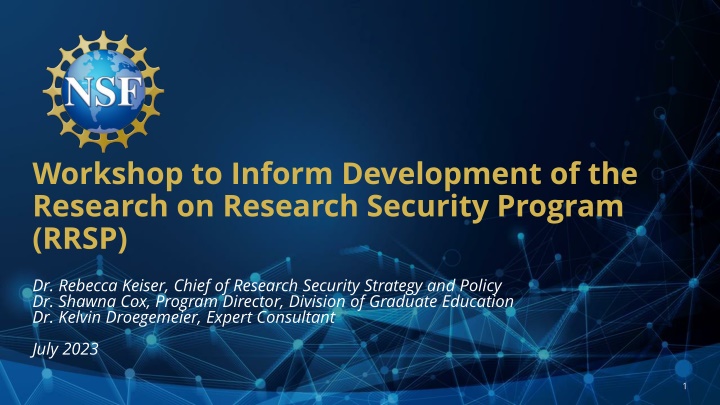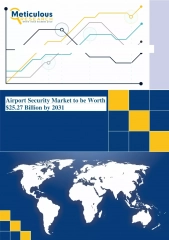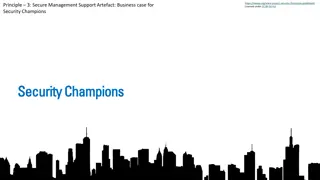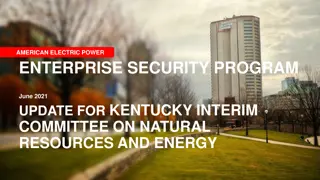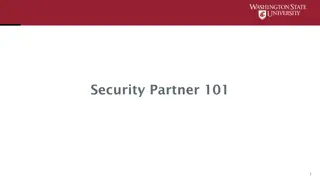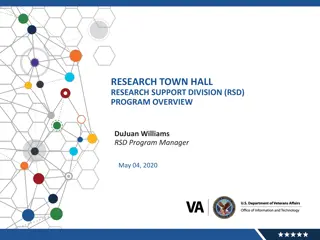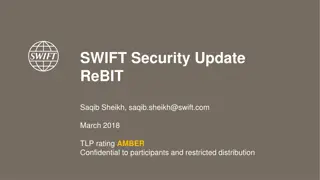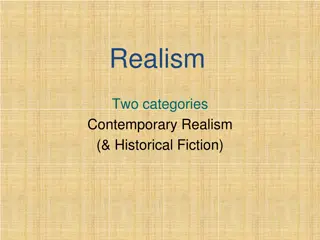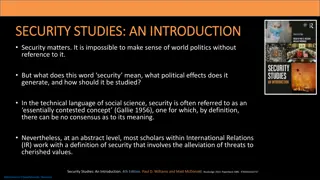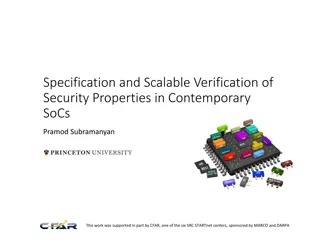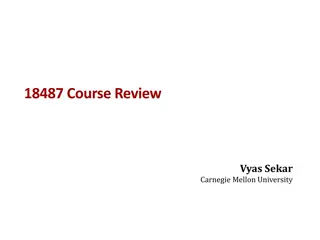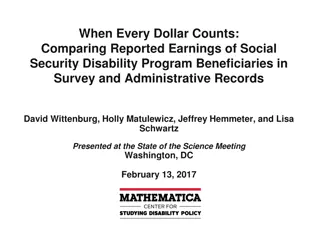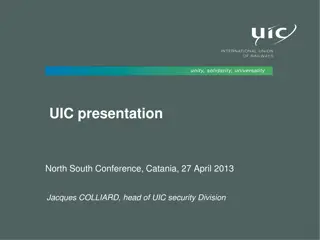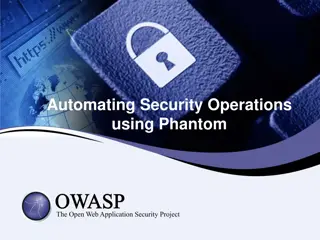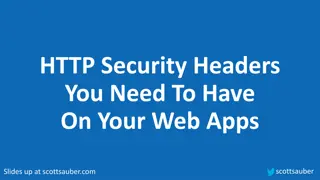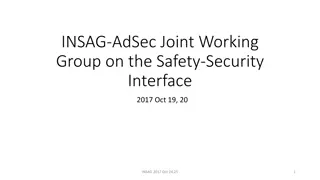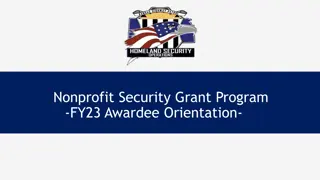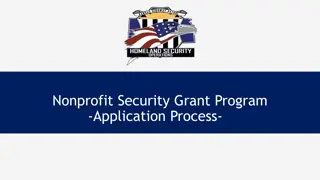Addressing Contemporary Challenges in Research Security Program Development
The Workshop to Inform Development of the Research on Research Security Program (RRSP) focuses on safeguarding the research enterprise amidst evolving global threats. Led by Dr. Rebecca Keiser and Dr. Shawna Cox, the program aims to balance security measures while maintaining an open and collaborative research environment. The challenges faced by researchers and institutions today include navigating collaborations with foreign entities, funding sources, and the disclosure of research information at international platforms. This workshop sheds light on these complexities to enhance research security strategies.
Download Presentation

Please find below an Image/Link to download the presentation.
The content on the website is provided AS IS for your information and personal use only. It may not be sold, licensed, or shared on other websites without obtaining consent from the author.If you encounter any issues during the download, it is possible that the publisher has removed the file from their server.
You are allowed to download the files provided on this website for personal or commercial use, subject to the condition that they are used lawfully. All files are the property of their respective owners.
The content on the website is provided AS IS for your information and personal use only. It may not be sold, licensed, or shared on other websites without obtaining consent from the author.
E N D
Presentation Transcript
Workshop to Inform Development of the Research on Research Security Program (RRSP) Dr. Rebecca Keiser, Chief of Research Security Strategy and Policy Dr. Shawna Cox, Program Director, Division of Graduate Education Dr. Kelvin Droegemeier, Expert Consultant July 2023 1
Background: NSFs Office of the Chief of Research Security Strategy and Policy (OCRSSP) The OCRSSP leads NSF's efforts to safeguard the research enterprise, developing policies and guardrails that balance the security of federally funded research with initiatives that maintain an open and collaborative international research environment The OCRSSP collaborates with federal partners and the White House to coordinate efforts aimed at improving research security and integrity at the federal level The OCRSSP engages with international partners to ensure current and future international collaborations continue to uphold core values such as openness, transparency, honesty, respect, and accountability 2
The Global Context for Research Security From WWII through the 1990s, the U.S. dominated global S&T research and technology Threats were relatively small and isolated, the U.S. lead was commanding The current global geopolitical context is vastly different Other nations are investing heavily and making great progress in S&T Some foreign governments are using illicit means to interfere with U.S. research, steal ideas and technology, and coerce researchers Risks are far greater, more diverse, and constantly evolving The historically open and collaborative international research environment is being exploited to America s disadvantage 3
Challenges Faced by Researchers & Institutions Today s complex geopolitical environment has created entirely new challenges for America s researchers Should I collaborate with individuals from this foreign entity? Does THIS collaborating foreign university have problematic ties to a military? Is it OK to be funded by THIS foreign government? Does partnering with THIS foreign company pose a threat to my research? Can I have a dual appointment with THIS foreign institution? Can I talk OPENLY about my research at an international conference? Can my graduate student accept a scholarship from THIS foreign organization? 4
Rigor & Reproducibility What is Research Security? Values Research Ethics Responsible Conduct of Research Research Integrity Research Security
Interest and Actions by the U.S. Government The White House Issued National Security Presidential Memorandum #33 (NSPM-33) and follow- on documents Specific guidance to agencies regarding disclosure requirements, research security programs, researcher training in research security, and more Congress Great concern several studies, hearings, and proposed legislation Competition with China is a key focus CHIPS and Science Act of 2022 contains numerous research security requirements for grant-making agencies, including NSF Funding Agencies Have created risk assessment frameworks, guidance to researchers 6
Understanding Research Security Research Security can be an elusive concept and tends to be viewed differently by various stakeholders Researchers Research institutions Federal funding agencies Intelligence community The military Private sector companies Law enforcement Others 7
Key Issues Remain to be Understood Nature of the threats Pervasiveness Seriousness Motivations of bad actors Identification mechanisms Mitigation and prevention strategies Prevention of stigmatization Other 8
Dear Colleague Letter (DCL) NSF seeks proposals to organize and facilitate a single workshop that will bring together diverse perspectives and stakeholders from all sectors of the research community, particularly those already engaged in research security-related research, to identify: Themes and topics that should be studied in the RRSP (see Potential Themes/Topics); Special considerations for and/or barriers to conducting research on the themes and topics, especially access to relevant data and associated statutory or regulatory restrictions; and Approaches that might be used to study the themes and topics systematically, qualitatively, and/or quantitatively. 9
Potential Themes/Topics for Proposals: Nature and Pervasiveness of Research Security Threats 1. The type, prevalence, frequency, seriousness, and potential implications and impacts of research security threats and violations, and the fields and technologies targeted most often. 2. Factors that motivate or compel individuals to violate research security rules and regulations. 3. Factors that justify classification or other restrictions on open basic/fundamental research. 4. Threats to the basic/fundamental research ecosystem that might result from overly aggressive or insufficiently aggressive approaches to addressing research security issues. 5. Real or perceived constraints on academic freedom resulting from research security rules and regulations. 6. Contrasts in research security risks between use-inspired and curiosity-driven foundational research2, as well as research security risks across the spectrum from foundational, applied, and translational research. 7. The ability to predict research security threats and violations, the data needed to make such predictions, and quantification of uncertainty associated with predictions. 10
Potential Themes/Topics for Proposals: Threat Identification, Mitigation and Prevention 1. The extent to which researchers and research organization leaders understand research security threats and current efforts to address them and the sources of information that have informed their understanding. 2. The effectiveness of current education and training efforts in research security and ways in which such effectiveness can be improved. 3. The impact on identification, mitigation, and prevention of research security threats and violations resulting from differing opinions and disinformation about science and research. 4. Factors that discourage individual and institutional reporting of research security threats and violations, and actions that can be taken to improve reporting. 5. Use of quantitative risk measurement and mitigation capabilities for research security threat and violation detection and prevention. 6. Use of artificial intelligence (AI) to help identify and mitigate research security threats and violations and ways in which AI might unintentionally or intentionally enhance them. 11
Potential Themes/Topics for Proposals: International Dimensions of Research Security 1. A comparison of U.S. actions in research security with those of other nations, the possibility and desirability of international collaboration in research security, and criteria for guiding the selection of partner nations with which the U.S. should collaborate on research security. 2. Impacts from research security threats and domestic policy decisions on recruitment and retention of foreign STEM talent, including factors and information sources that influence foreign nationals decisions to study or conduct research in the U.S. or elsewhere. 3. Impacts of real and perceived stigmatization on research security threat identification and mitigation, and strategies for overcoming them. 12
Workshop Participants and Format Engage a diverse array of national and international experts, from an equally diverse array of public and private organizations, in the following domains social, behavioral, and economic sciences; physical, natural and life sciences; mathematical sciences; engineering, computer science, data science & cybersecurity; international relations; and law enforcement and intelligence. NSF supports Broadening Participation efforts by soliciting and encouraging proposals from the full spectrum of diverse talent that society has to offer. Workshops may be virtual or in-person or contain elements of both. However, to maximize participation at in-person workshops, NSF encourages a virtual option for those who cannot or wish not to travel. 13
Preparing a Proposal Chapter I: Pre-Submission Information Section E. Who May Submit Proposals Institutions of Higher Education accredited in and with campuses in the U.S. Non-profit, Non-academic Organizations Tribal Governments Chapter II: Proposal Preparation Instructions Section F. Other Types of Proposals Item 9. Conference Proposals* Workshop proposals follow these instructions Research.gov: Choose PAPPG as current funding opportunity Research on Research Security Program (OD/OIA) Begin title with RRSP: 14
Discussion and Questions 15
